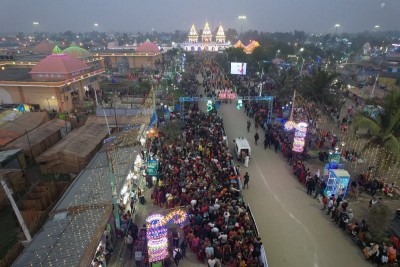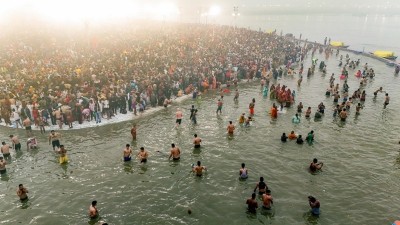January 19, 2025 11:34 am (IST)

APJ Abdul Kalam: The man with an ignited mind
"To succeed in life and achieve results, you must understand and master three mighty forces-desire, belief, and expectation."
These were some powerful words of APJ Abdul Kalam from his book Wings of Fire. And these words defined the man who rode truly in the wings of fire and ignited young minds with words and his body of work.
Writing a tribute to APJ Abdul Kalam is a rather challenging task for everyone. Should one introduce him as the "Missile Man" of India for his contribution to nuclear programme or was it his exciting tenure as the eleventh President of India with a mission to ignite the minds of India's younger people.
Either way, APJ Abdul Kalam was one of the worthiest sons of Independent India.
Born as Avul Pakir Jainulabdeen Abdul Kalam on Oct 15, 1931 in Tamil Nadu's Rameswaram, APJ Abdul Kalam, who died on July 27, 2015 was nuclear scientist and the President of India from 2002 to 2007.
A student of Physics and Aerospace Engineering, he was a foremost Indian scientist and science administrator, having worked at the Defence Research and Development Organisation (DRDO) and in the Indian Space Research Organisation (ISRO).
Kalam, who was a bachelor all his life, took India's civilian space programme and military missile development initiatives to great heights of achievement.
Not surprisingly, he was called the Missile Man of India for his role in the development of ballistic missile and launch vehicle technology in India while he was the moving force behind the 1998 Pokhran-II nuclear tests.
Interestingly, Kalam despite being a Muslim by religion was the first choice of the then ruling Hindu nationalist Bharatiya Janata Party (BJP) when he was elected President of India in 2002. The opposition Indian National Congress too supported his Presidency.
As a President, Kalam was different and he worked hard to reach out to the youth of India and inspire them. Anywhere in the world he went, he would visit academic institutions and interact with young minds.
For India Kalam had a vision.
He wrote in his book Wings of Fire: "I have three visions for India. In 3000 years of our history, people from all over the world have come and invaded us, captured our lands conquered our minds. From Alexander onwards. The Greeks, the Portuguese, the British, the French, the Dutch, all of them came and looted us, took over what was ours. Yet we have not done this to any other nation. We have not conquered anyone. We have not grabbed their land, their culture, their history and tried to enforce our way oflife on them. Why? Because we respect the freedom of others."
So Kalam would stress on Freedom as the first vision of India and said "we must protect and nurture and built on."
"If we are not free, no one will respect us," he would say.
His second vision for India was Development and wanted India to transform into a developed nation from being a developing nation for decades since Independence.
His third vision was that India must stand up to the world. "Because I believe that unless India stands up to the world, no one will respect us," he wrote.
Kalam lived by these beliefs and so even after his Presidency, he would work tirelessly to inspire Indians and stress of education, self-respect and development.
He had returned to his civilian life of education, writing, and public service since 2007 after leaving the office of President.
He was a visiting professor at the Indian Institute of Management Shillong, the Indian Institute of Management Ahmedabad and the Indian Institute of Management Indore, an honorary fellow of Indian Institute of Science, Bangalore, Chancellor of the Indian Institute of Space Science and Technology Thiruvananthapuram, professor of Aerospace Engineering at Anna University and an adjunct at many other academic and research institutions across India.
Either way, APJ Abdul Kalam was one of the worthiest sons of Independent India.
Born as Avul Pakir Jainulabdeen Abdul Kalam on Oct 15, 1931 in Tamil Nadu's Rameswaram, APJ Abdul Kalam, who died on July 27, 2015 was nuclear scientist and the President of India from 2002 to 2007.
A student of Physics and Aerospace Engineering, he was a foremost Indian scientist and science administrator, having worked at the Defence Research and Development Organisation (DRDO) and in the Indian Space Research Organisation (ISRO).
Kalam, who was a bachelor all his life, took India's civilian space programme and military missile development initiatives to great heights of achievement.
Not surprisingly, he was called the Missile Man of India for his role in the development of ballistic missile and launch vehicle technology in India while he was the moving force behind the 1998 Pokhran-II nuclear tests.
Interestingly, Kalam despite being a Muslim by religion was the first choice of the then ruling Hindu nationalist Bharatiya Janata Party (BJP) when he was elected President of India in 2002. The opposition Indian National Congress too supported his Presidency.
As a President, Kalam was different and he worked hard to reach out to the youth of India and inspire them. Anywhere in the world he went, he would visit academic institutions and interact with young minds.
For India Kalam had a vision.
He wrote in his book Wings of Fire: "I have three visions for India. In 3000 years of our history, people from all over the world have come and invaded us, captured our lands conquered our minds. From Alexander onwards. The Greeks, the Portuguese, the British, the French, the Dutch, all of them came and looted us, took over what was ours. Yet we have not done this to any other nation. We have not conquered anyone. We have not grabbed their land, their culture, their history and tried to enforce our way oflife on them. Why? Because we respect the freedom of others."
So Kalam would stress on Freedom as the first vision of India and said "we must protect and nurture and built on."
"If we are not free, no one will respect us," he would say.
His second vision for India was Development and wanted India to transform into a developed nation from being a developing nation for decades since Independence.
His third vision was that India must stand up to the world. "Because I believe that unless India stands up to the world, no one will respect us," he wrote.
Kalam lived by these beliefs and so even after his Presidency, he would work tirelessly to inspire Indians and stress of education, self-respect and development.
He had returned to his civilian life of education, writing, and public service since 2007 after leaving the office of President.
He was a visiting professor at the Indian Institute of Management Shillong, the Indian Institute of Management Ahmedabad and the Indian Institute of Management Indore, an honorary fellow of Indian Institute of Science, Bangalore, Chancellor of the Indian Institute of Space Science and Technology Thiruvananthapuram, professor of Aerospace Engineering at Anna University and an adjunct at many other academic and research institutions across India.
He taught information technology at the International Institute of Information Technology, Hyderabad and technology at Banaras Hindu University and Anna University.
A recipient of many awards, he was also contemporary India's undisputed recipient of Bharat Ratna, India's highest civilian honour.
It was an end of an era in the world of Indian science and politics with his death at age 83 from a cardiac arrest in Shillong.
Kalam left millions of Indians teary eyed as the country, including political leaders, posted their reactions and memories on various social networking sites.
Prime Minister Narendra Modi tweeted: "India mourns the loss of a great scientist, a wonderful President & above all an inspiring individual. RIP Dr. APJ Abdul Kalam."
A recipient of many awards, he was also contemporary India's undisputed recipient of Bharat Ratna, India's highest civilian honour.
It was an end of an era in the world of Indian science and politics with his death at age 83 from a cardiac arrest in Shillong.
Kalam left millions of Indians teary eyed as the country, including political leaders, posted their reactions and memories on various social networking sites.
Prime Minister Narendra Modi tweeted: "India mourns the loss of a great scientist, a wonderful President & above all an inspiring individual. RIP Dr. APJ Abdul Kalam."
Support Our Journalism
We cannot do without you.. your contribution supports unbiased journalism
IBNS is not driven by any ism- not wokeism, not racism, not skewed secularism, not hyper right-wing or left liberal ideals, nor by any hardline religious beliefs or hyper nationalism. We want to serve you good old objective news, as they are. We do not judge or preach. We let people decide for themselves. We only try to present factual and well-sourced news.
Support objective journalism for a small contribution.
Latest Headlines
Saif Ali Khan stabbing: After days of manhunt, Mumbai Police arrest attacker from Thane
Sun, Jan 19 2025
Railway Minister reviews progress of India’s first undersea tunnel for bullet train
Sat, Jan 18 2025
PM Modi distributes over 65 lakh property cards under SVAMITVA scheme to boost rural empowerment
Sat, Jan 18 2025
Saif Ali Khan’s health insurance provider reveals his claim amount for hospital expenses
Sat, Jan 18 2025
Amit Shah forms inter-ministerial team to investigate mysterious deaths in J&K's Rajouri
Sat, Jan 18 2025
Saif Ali Khan stabbing: Suspect held in Chhattisgarh; Mumbai Police on the way to take custody
Sat, Jan 18 2025
Two suspects detained over Saif Ali Khan stabbing case
Sat, Jan 18 2025







